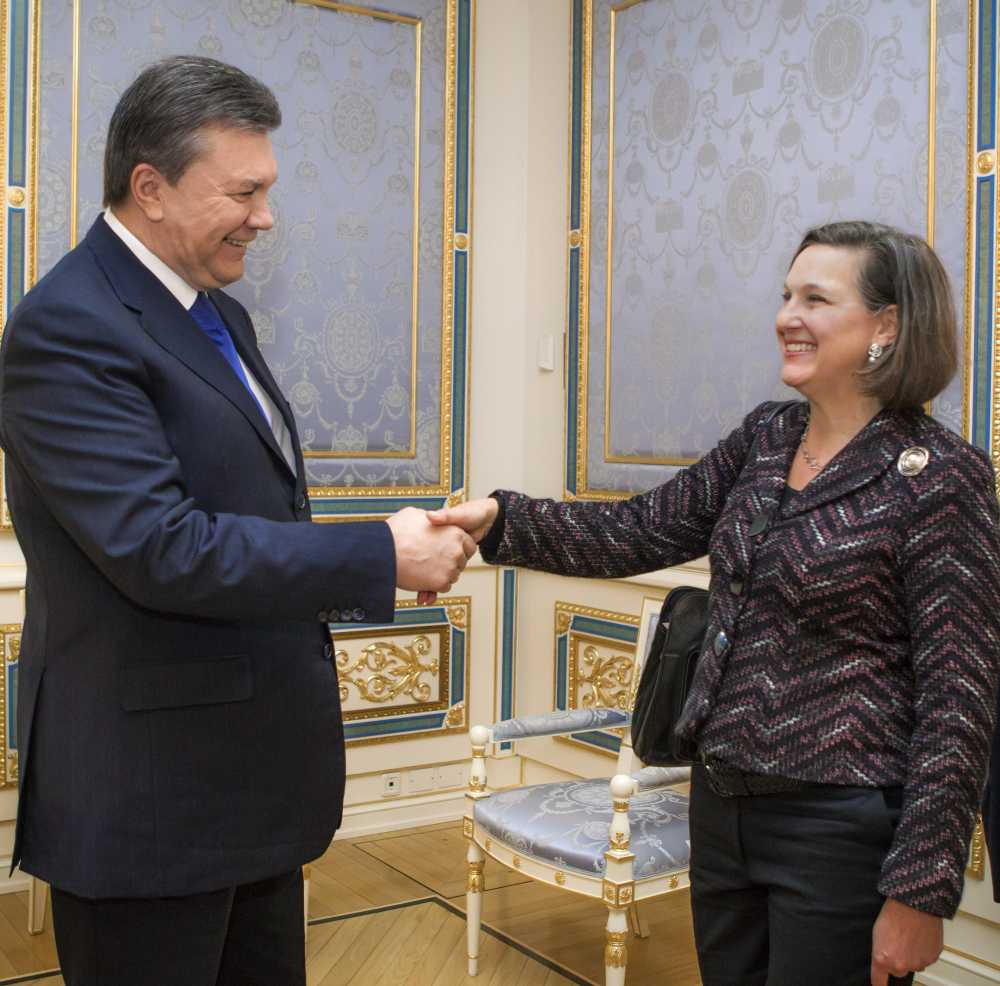KIEV, Ukraine — Washington is willing to consider financial aid to Ukraine as the country struggles through a polarizing political crisis, but only if it undertakes political and economic reforms, a top U.S. diplomat said Friday.
The comment by Assistant Secretary of State Victoria Nuland comes after the opposition leaders behind more than two months of protests suggested that Ukraine needs aid akin to the Marshall Plan, the U.S. program that propped up European nations after World War II to encourage political stability.
Nuland spoke to reporters at the end of a two-day visit that included separate meetings with President Viktor Yanukovych and leaders of the protests seeking his resignation.
“Nobody is willing to give economic support, from the United States or from the IMF or from Europe, to an unreformed Ukraine,” Nuland said.
Ukraine’s faltering economy is a key issue in the crisis. Huge protests began when Yanukovych shelved an agreement to deepen ties with the 28-nation European Union in favor of getting a $15 billion loan from Russia. Many Ukrainians resent the long shadow Russia has cast over Ukraine.
The protests quickly expanded their grievances to calls for Yanukovych’s resignation and the denunciation of police violence after the brutal dispersal of some early peaceful rallies. The demonstrations erupted into clashes last month after Yanukovych approved harsh laws against protesters. At least three protesters died in the clashes.
The anti-protest laws were repealed, but protesters remain in a sprawling tent camp in downtown Kiev while extensive barricades of snow and refuse block several of the capital’s main streets.
Yanukovych backed off the long-anticipated agreement with the EU because of concerns that the bloc was not offering a sufficient cushion for trade that presumably would be lost with Russia, which wants Ukraine to join a Moscow-led trade alliance. Opponents say that effectively aims to reconstitute the defunct Soviet Union in a group dominated by Russian President Vladimir Putin.
“We have been in conversation with Russia with regard to the situation in Ukraine. Our message has been that we all — Ukrainians, Russians, Americans, all of Ukraine’s neighbors — have an interest in a stable peaceful, democratic Ukraine,” Nuland said.
Ukraine’s economic troubles include its reliance on energy-inefficient heavy industries and its policy of selling gas to households at about one-fifth the price it pays Russia for the imports.
The International Monetary Fund in 2012 denied Ukraine a sought-after aid package because Yanukovych was unwilling to implement economic reforms and austerity measures that could have undermined his support.
The economic issue is becoming acute in the political turmoil. The currency, the hryvna, has lost about 7 percent of its value since December. The national bank on Friday reported that its international reserves dropped 12.8 percent in January.
Meanwhile, credit rating agency Fitch on Friday downgraded Ukraine’s credit grade to the lowest possible level for a country that is not in default of its debt. It cited the risk that Russia might pull its financial support.
Nuland’s comments on aid paralleled the position put forth by Catherine Ashton, the EU’s top foreign affairs envoy, on a visit to Kiev this week.
Both Washington and Brussels are calling for peaceful resolution of the crisis. But an intercepted phone call between Nuland and US Ambassador Geoffrey Pyatt has drawn attention to American impatience with the EU. In the recording, leaked online, Nuland profanely dismisses the EU and its efforts in Ukraine.
The United States has imposed mild sanctions on Ukraine, cancelling the visas of several officials connected with the police violence, while the EU, whose consensus decisions move slowly, has held back from sanctions.
Nuland on Friday said she would not comment on the substance of the taped recording, which also included a discussion of the merits of the top opposition leaders known colloquially as “the big three.”
The leak, which the White House suggests was made by Russia, reinforced widespread Russian contentions that the West is manipulating the Ukrainian opposition and exploiting the country’s political crisis.
“By tearing away, by separating them from our union, our historically close ties, it of course means the weakening of Russia,” said Vladimir Rodin, a member of the Russian parliament.
Send questions/comments to the editors.



Success. Please wait for the page to reload. If the page does not reload within 5 seconds, please refresh the page.
Enter your email and password to access comments.
Hi, to comment on stories you must . This profile is in addition to your subscription and website login.
Already have a commenting profile? .
Invalid username/password.
Please check your email to confirm and complete your registration.
Only subscribers are eligible to post comments. Please subscribe or login first for digital access. Here’s why.
Use the form below to reset your password. When you've submitted your account email, we will send an email with a reset code.